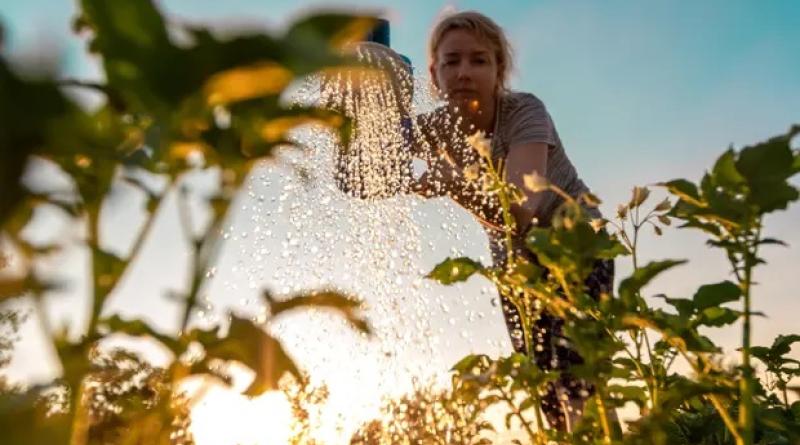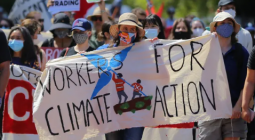Cop27 is here and the climate crisis is daunting but here’s the key to tackling it – cheer up

We environmentalists must avoid sending the message that the situation is hopeless. Let’s focus on solutions
My dear fellow environmentalists,
With the Cop27 summit about to be begin, can we please think about how we talk about the climate crisis? The scale of it is there to see – it can’t be missed – but haven’t we read enough books and attended enough events where we are told, once again, about the historic causes of the problem, the intransigent complexity of the problem and the inevitable worsening of the problem? Given a little more time, I swear that most speakers would detail the length, depth and height of the problem. It is depressing. It doesn’t help. Please stop.
I sit at these events – pen and notebook in hand – listening for solutions. Not long ago, I sat through a talk about biodiversity loss. At the end of it, a member of the audience, who was obviously feeling as frustrated as I was, asked rather desperately, “But what can we do?” “Conversation,” the speaker suggested. I didn’t write this down.
I know that the problem is serious; I’ve read (most of) the IPCC report, and listened to the podcasts – all reminding me that this is an emergency. But don’t most people know this now? It is beginning to feel as if we are running around shouting, “Smoking is bad for you!” We know. Gloom and hopelessness are not great motivators and too many environmentalists have almost given up. People are so relieved when I tell them I have a pragmatic, life-enriching approach.
Call me a misguided optimist, but I believe that the changes we make can, and are, making a difference. So if you are giving a talk or writing about the environment, don’t waste the opportunity to give people specific actions they can each take. Here are some:
Be a little bit activist
We know that individual change isn’t enough and we have to lobby the most heinous polluters, too. You don’t have to glue yourself to the road if you don’t want to. But find a form of activism that works for you. One person told me: “I loved sitting in the summer sunshine at Balcombe during the anti-fracking campaign.” And of course – they won eventually. There is no fracking in Sussex. The prime minister, Rishi Sunak – who is finally, reluctantly, heading to Cop27 – says no fracking on his watch.
Personally, I love drumming with a samba band if there is some environmental action going on. Everyone loves the band. One year, even the police got into trouble for dancing. So don’t do nothing. Just find activism that you enjoy.
We do need to be radical. We need to change the way that we live – in every way. It’s about living lives that are designed to support the Earth. And it can be done in ways that enhance our lives too. Life is short and we have a planet to save.
Leave your high street bank
Your loyalty is misplaced. They don’t have their lending and investment portfolio in the public domain and are almost certainly supporting the fossil fuel industry. Move to Triodos Bank which is transparent and which won best ethical financial provider at the Best Bank awards.
Other banks with a reasonable ethical policy are the Cumberland Building Society, Monzo, Nationwide and Starling.
Wear the clothes you already have
Radical, huh? Get creative. Learn to sew, mend and celebrate your clothes. You have enough clothes already.
Live simply. Live with less. It’s much more peaceful. And cheaper.
Take no national flights and give up the car
I have a friend who has given up her car and bought a cargo bike. She cycles her two children to school. They ride with their dog. They wave at passersby in all weathers. They all love it.
Take one international flight every other year – a holiday. Frequent flyers are the problem, not families going on holiday once year or less.
Fall in love with nature
It’s well established that being in nature supports our mental health. Even a window box lifts our hearts and is also loved by pollinators. Composting is a mystical black art. You take waste and make life.
If you don’t have a garden, find a friend who does and help them.
Buy UK-grown food
This is the one thing people all across the political spectrum agree on. With the money you save from not shopping, buy organic food for the sake of biodiversity and your health. Seasonal eating is the best adventure.
Find a delivery box of local organic seasonal food. Even if you still eat meat learn how to make delicious vegan meals with colour. Grow your own herbs and spices.
Remove plastic from your home completely
Let’s be radical and not just ditch single-use plastic. Fossil fuel companies spend millions trying to sell us plastic crap we don’t need.
I appreciate that plastic is important in medicine, but in our homes? No thanks. Handmade items created with love are much more sensuous and life enhancing.
Support what works
Support the Fossil Fuel Non Proliferation Treaty or Rewilding Britain or Stop Ecocide or Client Earth or the RSPB – enjoy choosing.
The point is to support some humans that you know are doing good work.
Become an expert in your home energy supply
Normally, I recommend moving to one of the three most ethical sustainable energy companies, which according to Ethical Consumer magazine are GEUK, Good Energy and Ecotricity. But because of the energy crisis everyone has to stay where they are for a while. So what can we do about the outrageous profits and moral bankruptcy of the energy companies? Don’t use their energy.
If you can afford to, it is time to install solar panels. If you can’t do this, fill your kettle from a mug: we use a lot of energy in our homes overfilling our kettles and boiling them nine times a day. Switch everything off. Use hot-water bottles. Hang heavy curtains in winter and if you really want to be radical – learn about the health benefits of cold showers. Seriously. They are exhilarating. They wake you up.
-
Isabel Losada is the author of The Joyful Environmentalist: How to Practise without Preaching
cover photo: Fall in love with nature… If you don’t have a garden, find a friend who does and help them.’ Photograph: rbkomar/Getty Images





